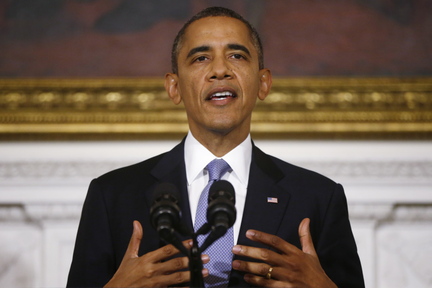WASHINGTON — President Obama is preparing a package of intelligence reforms that will probably put a public advocate for the first time in the secret court that approves surveillance practices and remove a controversial telephone records database from direct government control, aides said.
With plans to unveil the changes days before the State of the Union address on Jan. 28, key presidential advisers are looking skeptically at a separate proposal to require a federal judge to approve each use of a “national security letter” except in emergencies, however.
Law enforcement officials issue the letters, a little-known form of administrative subpoena that doesn’t require a warrant, to secretly compel disclosure of otherwise private customer records by Internet providers, financial institutions, telephone and credit companies, and other services and organizations.
The FBI has issued more than 123,000 such letters for people in or from the U.S. since 2004, federal records show, including more than 15,000 in 2012, the last year for which data are available.
Obama has not made his own position clear, but the proposal to require judicial review each time the government seeks third-party records has sparked the most push-back from national security officials, including the FBI and some top White House advisers.
“There is concern that this proposal makes it more cumbersome to investigate a terrorist than it does a criminal,” said a senior administration official, who spoke on condition of anonymity to discuss internal deliberations.
Last March, a federal judge ruled the program unconstitutional and ordered the FBI to stop issuing the letters because they contain a gag order that bars recipients from revealing the document’s existence or its demands. Senior U.S. District Judge Susan Illston of the Northern District of California stayed her order pending government appeal.
Adding judicial review to the national security letters was among the 46 recommendations of a presidential task force that examined U.S. surveillance programs after former National Security Agency contractor Edward Snowden’s torrent of leaks on domestic and foreign surveillance operations.
Obama, who vowed to study the panel’s report during his two-week holiday in Hawaii, plans to meet with his national security team and outside experts to finalize his reforms after he returns to Washington on Sunday. Aides said he wants to boost public confidence that he is protecting Americans’ privacy while safeguarding national security.
Obama already has put several of the panel’s proposals in the “likely” category, aides said. They include creating a position for an independent lawyer to argue for privacy rights and civil liberties before the Foreign Intelligence Surveillance Court.
The court, which was created in 1978 and meets in secret, only hears from government lawyers seeking permission for additional surveillance – not from opponents. Records show the court grants nearly all of the government’s requests.
The White House favors changing the procedure to ensure “that the government’s position is challenged by an adversary,” according to an administration official.
The chief justice of the Supreme Court appoints the 11 federal judges on the secret court. It’s unclear whether Obama has embraced the panel’s recommendation to let other Supreme Court judges also play a role, or other proposed changes to the court.
Obama apparently supports shifting the NSA’s bulk collection and storage of domestic telephone calling records to private hands, a change he first signaled at a news conference the day he left for Hawaii. For Americans, the secret archiving of numbers and other data from virtually every U.S. phone call is arguably the most controversial of the surveillance operations revealed by Snowden.
Obama’s top advisers are not considering stopping the program, as some critics insist, because they are convinced the data may be crucial in counterterrorism investigations.
Instead, his advisers are trying to hash out how to ensure that telephone companies or other third-party groups will hold the data but make it available to the NSA or another agency when a judge orders it.
Send questions/comments to the editors.


